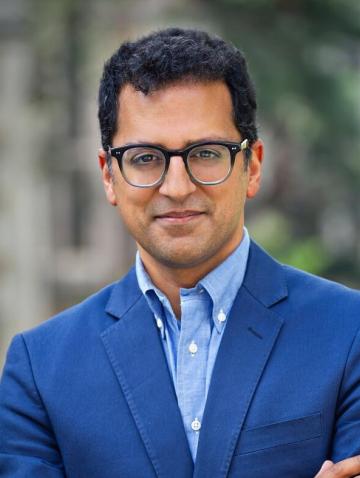Hussein Fancy
Associate Professor, Department of History
Hussein Fancy is a historian of medieval Europe and the Islamic world. His research and writing focus on the economic, social, legal, and intellectual history of interaction between Jews, Christians, and Muslims in the medieval Mediterranean. In particular, he pursues projects that combine Latin, Arabic, and Romance archival sources.
Fancy’s first book, The Mercenary Mediterranean, examined the service of Muslim soldiers from North Africa to the Christian kings of the Crown of Aragon in the thirteenth and fourteenth centuries. Far from marking the triumph of toleration, he argued, the alliance of Christian kings and Muslim soldiers depended on and reproduced ideas of religious difference. The Mercenary Mediterranean received the Herbert Baxter Adams Prize from the American Historical Association for the best first book in European history, the L. Carl Brown Prize from the American Institute of Maghreb Studies for the best book in North African studies, and the Jans F. Verbruggen Prize from De Re Militari for the best book in medieval military history. Most recently, along with Alejandro García-Sanjuán, he edited What Was the Islamic Conquest of Iberia?, a collection that examined the on-going scholarly controversies surrounding the Islamic conquest of the Iberian Peninsula in 711.
He is currently working on two projects. The first, entitled The Impostor Sea: The Making of the Medieval Mediterranean, follows the activities of criminal merchants—pirates and smugglers—to rethink the relationship between religion and trade. Rather than “enemies of all,” this book argues that these figures were central to the making of new legal, religious, and racial boundaries in the late medieval Mediterranean. The second, entitled The Eastern Question, examines western views of Islam from the seventh century to the present, arguing that both positive and negative images of Islam across history share the same polemical genealogy.
Fancy received his B.A. in English from Yale University and a Ph.D. in History from Princeton University, where he studied with William Chester Jordan and Michael Cook. Before coming to Yale, he taught at the University of Michigan for eleven years. Fancy was a Junior Fellow of the Michigan Society of Fellows, a Carnegie Scholar, an ACLS Fellow, and a Rome Prize Fellow of the American Academy in Rome. He has served as a Councillor of the Medieval Academy of America and as a board member of the American Institute of Maghreb Studies and the Spain and North Africa Project. He has also lived and worked extensively in Spain, Italy, France, and across North Africa.
Professor Fancy welcomes inquiries from prospective graduate students interested in any aspect of Medieval European and/or Islamic History, particularly comparative study.
